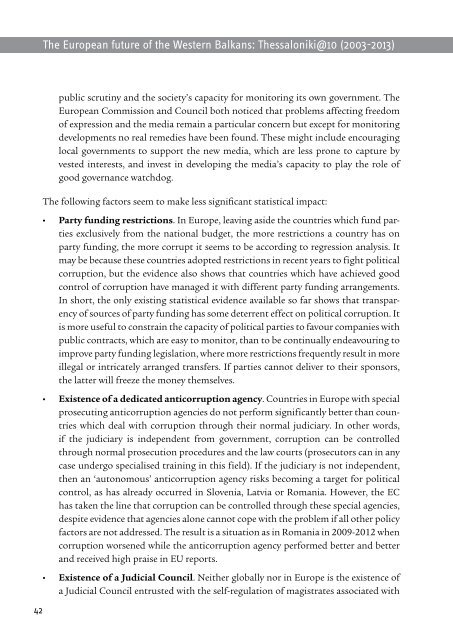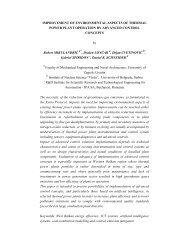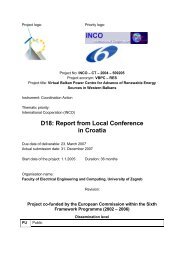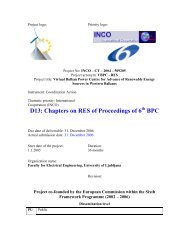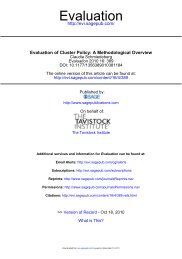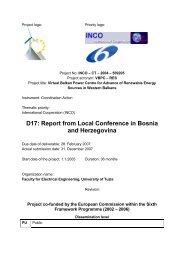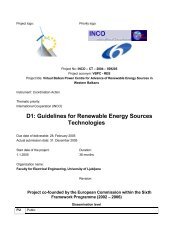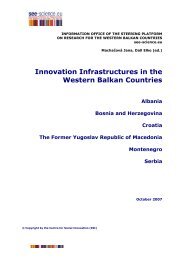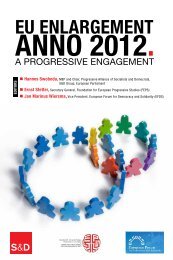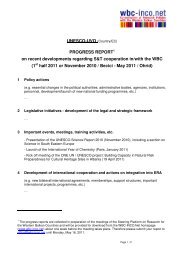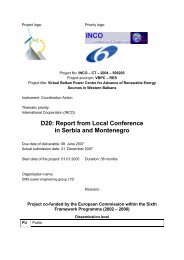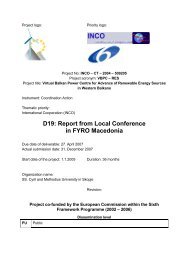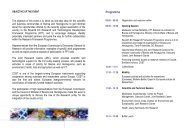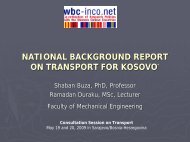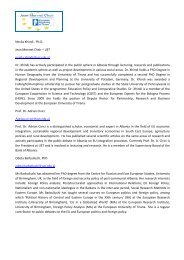The European future of the Western Balkans: Thessaloniki@10
The European future of the Western Balkans: Thessaloniki@10
The European future of the Western Balkans: Thessaloniki@10
You also want an ePaper? Increase the reach of your titles
YUMPU automatically turns print PDFs into web optimized ePapers that Google loves.
42<br />
<strong>The</strong> <strong>European</strong> <strong>future</strong> <strong>of</strong> <strong>the</strong> <strong>Western</strong> <strong>Balkans</strong>: <strong>The</strong>ssaloniki@10 (2003-2013)<br />
public scrutiny and <strong>the</strong> society’s capacity for monitoring its own government. <strong>The</strong><br />
<strong>European</strong> Commission and Council both noticed that problems affecting freedom<br />
<strong>of</strong> expression and <strong>the</strong> media remain a particular concern but except for monitoring<br />
developments no real remedies have been found. <strong>The</strong>se might include encouraging<br />
local governments to support <strong>the</strong> new media, which are less prone to capture by<br />
vested interests, and invest in developing <strong>the</strong> media’s capacity to play <strong>the</strong> role <strong>of</strong><br />
good governance watchdog.<br />
<strong>The</strong> following factors seem to make less significant statistical impact:<br />
• Party funding restrictions.<br />
In Europe, leaving aside <strong>the</strong> countries which fund parties<br />
exclusively from <strong>the</strong> national budget, <strong>the</strong> more restrictions a country has on<br />
party funding, <strong>the</strong> more corrupt it seems to be according to regression analysis. It<br />
may be because <strong>the</strong>se countries adopted restrictions in recent years to fight political<br />
corruption, but <strong>the</strong> evidence also shows that countries which have achieved good<br />
control <strong>of</strong> corruption have managed it with different party funding arrangements.<br />
In short, <strong>the</strong> only existing statistical evidence available so far shows that transparency<br />
<strong>of</strong> sources <strong>of</strong> party funding has some deterrent effect on political corruption. It<br />
is more useful to constrain <strong>the</strong> capacity <strong>of</strong> political parties to favour companies with<br />
public contracts, which are easy to monitor, than to be continually endeavouring to<br />
improve party funding legislation, where more restrictions frequently result in more<br />
illegal or intricately arranged transfers. If parties cannot deliver to <strong>the</strong>ir sponsors,<br />
<strong>the</strong> latter will freeze <strong>the</strong> money <strong>the</strong>mselves.<br />
• Existence <strong>of</strong> a dedicated anticorruption agency.<br />
Countries in Europe with special<br />
prosecuting anticorruption agencies do not perform significantly better than countries<br />
which deal with corruption through <strong>the</strong>ir normal judiciary. In o<strong>the</strong>r words,<br />
if <strong>the</strong> judiciary is independent from government, corruption can be controlled<br />
through normal prosecution procedures and <strong>the</strong> law courts (prosecutors can in any<br />
case undergo specialised training in this field). If <strong>the</strong> judiciary is not independent,<br />
<strong>the</strong>n an ‘autonomous’ anticorruption agency risks becoming a target for political<br />
control, as has already occurred in Slovenia, Latvia or Romania. However, <strong>the</strong> EC<br />
has taken <strong>the</strong> line that corruption can be controlled through <strong>the</strong>se special agencies,<br />
despite evidence that agencies alone cannot cope with <strong>the</strong> problem if all o<strong>the</strong>r policy<br />
factors are not addressed. <strong>The</strong> result is a situation as in Romania in 2009-2012 when<br />
corruption worsened while <strong>the</strong> anticorruption agency performed better and better<br />
and received high praise in EU reports.<br />
Existence <strong>of</strong> a Judicial Council<br />
• . Nei<strong>the</strong>r globally nor in Europe is <strong>the</strong> existence <strong>of</strong><br />
a Judicial Council entrusted with <strong>the</strong> self-regulation <strong>of</strong> magistrates associated with


